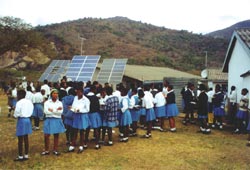Initiatives in South Africa

The
government of National Unity faces the challenge of creating
an
education and training system
that will
fulfil the visionof “opening
doors of
learning and culture to all”
ITU 980035
Dept. of Communications, South Africa
|
Providing access to ICTs is considered an
important national goal in the government’s Reconstruction and Development
Programme. The objective of the Universal Service Agency established by the
Telecommunications Act (1996) is to facilitate access to telecommunications and
other ICTs for all. One of the main activities of this Agency has been the
establishment of telecentres. An estimated 5000 telecentres need to be
established to provide true universal access in South Africa. Given the
magnitude of such a task, the focus is to develop a number of successful models
that offer access to ICTs in disadvantaged areas to encourage other public,
private and community initiatives to provide national coverage.
In August 2000, there were 63 telecentres, primarily in rural
areas. Telecentres are financed from the Universal Service Fund of around USD
2.1 million per year, which comes from a levy on telecommunication operators.
IDRC has lent support to12 of the telecentres. UNDP, the Dutch government and
other donors have also given their support.
These telecentres cost about USD 30 000 and though the exact
specification varies, most have four computers, four telephone lines, a printer,
a copier and a television. Most of the telecentres are owned by community
organizations, women’s organizations or community forums. A few are owned
privately and others are attached to existing public services (such as
libraries, schools and post offices).
The Agency has carried out baseline research on telecentres
in three provinces, and conducted studies on community information needs with
six telecentres in the Northern Province.

AfricaAlumnos de
zonas rurales y apartadas pueden aprovechar las TIC gracias a sistemas de
energía solar
Fotos: Solar
Electric Light Fund
|
While the telecentres based in townships profitably offer
telephony services, computer training, with proper accreditation, seems to be
the most profitable activity. Overall, about half of the telecentres appear to
be economically sustainable.
|

ITU
020074
Photos:
Solar Electric Light Fund
|
Apart from the Agency’s telecentres, there are several
other community access initiatives in the country. An estimated 700 community
ICT projects are said to be in place, including multipurpose community centres,
digital villages, community computing centres and information literacy sites.
The Government Communication and Information System was given a cabinet mandate
to coordinate government delivery in rural areas. It is setting up multipurpose
community centres offering a range of government services such as health,
welfare, home affairs and housing. Twenty of these centres had been established
by the time of ITU TELECOM AFRICA 2001 last November.
|